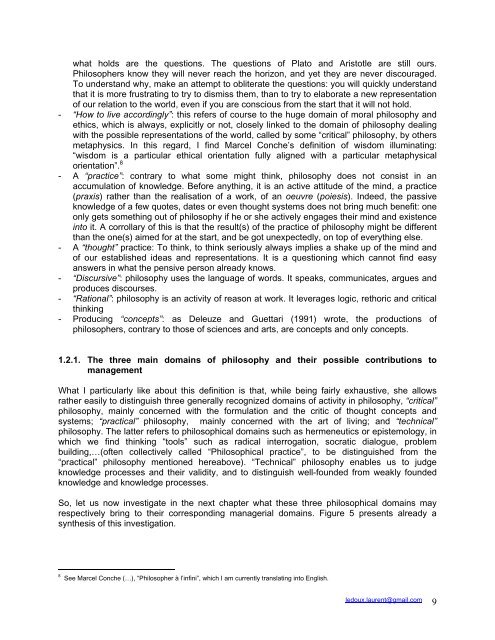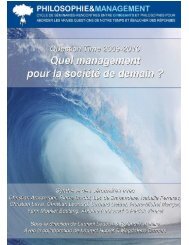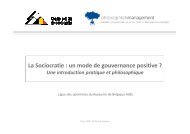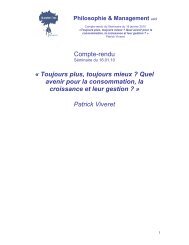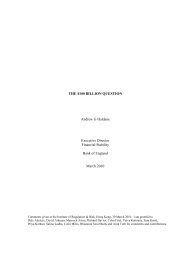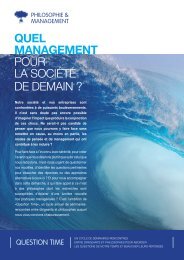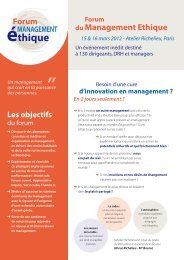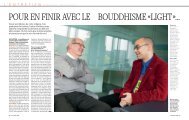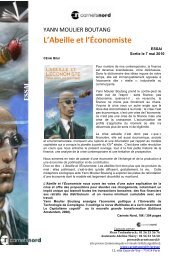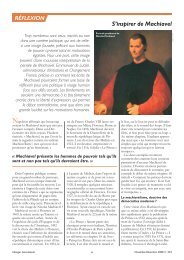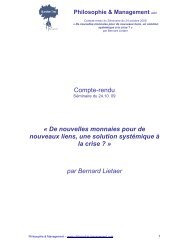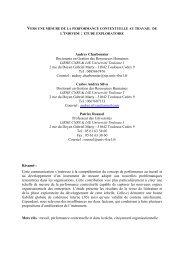Philosophy: The Managers - Philosophie Management
Philosophy: The Managers - Philosophie Management
Philosophy: The Managers - Philosophie Management
Create successful ePaper yourself
Turn your PDF publications into a flip-book with our unique Google optimized e-Paper software.
what holds are the questions. <strong>The</strong> questions of Plato and Aristotle are still ours.<br />
Philosophers know they will never reach the horizon, and yet they are never discouraged.<br />
To understand why, make an attempt to obliterate the questions: you will quickly understand<br />
that it is more frustrating to try to dismiss them, than to try to elaborate a new representation<br />
of our relation to the world, even if you are conscious from the start that it will not hold.<br />
- “How to live accordingly”: this refers of course to the huge domain of moral philosophy and<br />
ethics, which is always, explicitly or not, closely linked to the domain of philosophy dealing<br />
with the possible representations of the world, called by some “critical” philosophy, by others<br />
metaphysics. In this regard, I find Marcel Conche’s definition of wisdom illuminating:<br />
“wisdom is a particular ethical orientation fully aligned with a particular metaphysical<br />
orientation”. 8<br />
- A “practice”: contrary to what some might think, philosophy does not consist in an<br />
accumulation of knowledge. Before anything, it is an active attitude of the mind, a practice<br />
(praxis) rather than the realisation of a work, of an oeuvre (poiesis). Indeed, the passive<br />
knowledge of a few quotes, dates or even thought systems does not bring much benefit: one<br />
only gets something out of philosophy if he or she actively engages their mind and existence<br />
into it. A corrollary of this is that the result(s) of the practice of philosophy might be different<br />
than the one(s) aimed for at the start, and be got unexpectedly, on top of everything else.<br />
- A “thought” practice: To think, to think seriously always implies a shake up of the mind and<br />
of our established ideas and representations. It is a questioning which cannot find easy<br />
answers in what the pensive person already knows.<br />
- “Discursive”: philosophy uses the language of words. It speaks, communicates, argues and<br />
produces discourses.<br />
- “Rational”: philosophy is an activity of reason at work. It leverages logic, rethoric and critical<br />
thinking<br />
- Producing “concepts”: as Deleuze and Guettari (1991) wrote, the productions of<br />
philosophers, contrary to those of sciences and arts, are concepts and only concepts.<br />
1.2.1. <strong>The</strong> three main domains of philosophy and their possible contributions to<br />
management<br />
What I particularly like about this definition is that, while being fairly exhaustive, she allows<br />
rather easily to distinguish three generally recognized domains of activity in philosophy, “critical”<br />
philosophy, mainly concerned with the formulation and the critic of thought concepts and<br />
systems; “practical” philosophy, mainly concerned with the art of living; and “technical”<br />
philosophy. <strong>The</strong> latter refers to philosophical domains such as hermeneutics or epistemology, in<br />
which we find thinking “tools” such as radical interrogation, socratic dialogue, problem<br />
building,…(often collectively called “Philosophical practice”, to be distinguished from the<br />
“practical” philosophy mentioned hereabove). “Technical” philosophy enables us to judge<br />
knowledge processes and their validity, and to distinguish well-founded from weakly founded<br />
knowledge and knowledge processes.<br />
So, let us now investigate in the next chapter what these three philosophical domains may<br />
respectively bring to their corresponding managerial domains. Figure 5 presents already a<br />
synthesis of this investigation.<br />
8<br />
See Marcel Conche (…), “Philosopher à l’infini”, which I am currently translating into English.<br />
ledoux.laurent@gmail.com<br />
9


